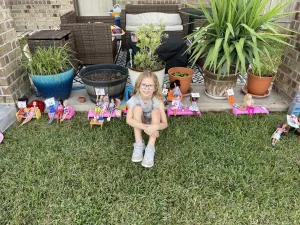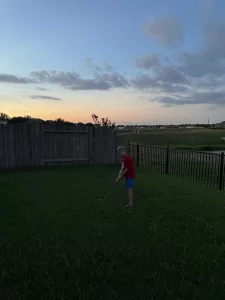Recently, I saw a lot of articles and posts lamenting that tweens (and even younger) are no longer asking for things like baby dolls or Barbies at Christmas or for birthday gifts; they are asking for fancy water cups or skincare products. Personally, so many of my friends have a hard time getting their children- even elementary aged children- off of electronic devices and into imaginative play outdoors or with toys.
I feel really lucky that my kids are both really active and we have a natural balance between the analog and digital worlds. I don’t have to make many ultimatums to get my two to flex their imaginations.
Maybe because I’m a writer, or maybe it’s just the way my brain works, but I spend a lot of time in my own imagination. It’s a blessing {my inner emotional life is rich! I have infinite stories to tell!} and a curse {I overthink!}. It’s also a muscle you have to use in order to maintain. I devote time to daydreaming or journaling to keep mine strong.
My two children are “big kids” now, age 10 and 6.5. Sometimes, it feels like my only parenting goal is to keep them from growing up too fast. Here are a few simple ways you can nurture your big kids imaginations:
Freedom
Making sure they have a lot of freedom and free time to play or even “get bored” is important to me. We limit our children’s scheduled activities, like sports or dance, so that most days are unscheduled. As they get older, these stretches of freedom will get smaller and smaller, so we prioritize it at these ages. It works for us.
Solo Play
If you have multiple children, it’s a great skill for them to learn how to use their imaginations to play together; there is equal value in solo play, though.
Giving your big kid space to play alone, without an audience and without any playmate, is crucial in nurturing their imagination. I remind my children, if they want to avoid fighting about how to play, playing alone is the best solution.
The Right Tools
Figurines and action figures, or smaller dolls (LOL, Polly Pocket) are some of the most beloved in my household. If your child has a specific interest Super Mario Roblox, Bluey) allow that to spark their imagination.
If they are out of practice and need an idea of how to play, encourage them to watch an episode of a show or movie and “act out” the action with their figures. This is also great if you have a child who loves to perform- put on a musical and let them act out the songs and dances. This can spark imaginative play beyond the stories on the screen.
Sports and Solo Play
Both my children love to play sports, but it’s hard to have a full basketball or field hockey game without a team. Here’s where imagination comes in: whatever ‘sport’ your child is into can be played solo, against an imaginary opponent or with imaginary teams.
My son imagines where the greens and sand traps are when he chips practice golf balls around our yard. My daughter defeats imaginary foes racing on her scooter, alone. The world is literally anything you want it to be, and if your child has forgotten that, it’s important to remind them!
Don’t Criticize
It should go without saying, but there is no wrong way to play. All toys are meant for everyone; all imaginative play is meant for everyone. Telling your child that a game or toy isn’t meant for their gender, age, or anything else is not the way to nurture their desire to flex their imagination.
Sometimes, this means being ok with messes, too. Use it as a teachable moment on picking up after oneself when your child wants to set up complex or complicated games with lots of materials.

Happy Playtime!
















